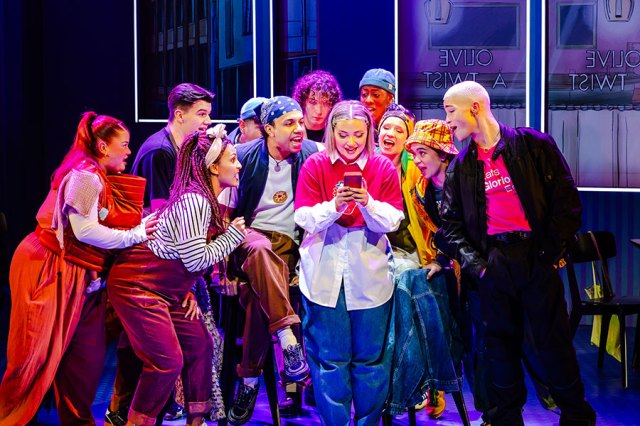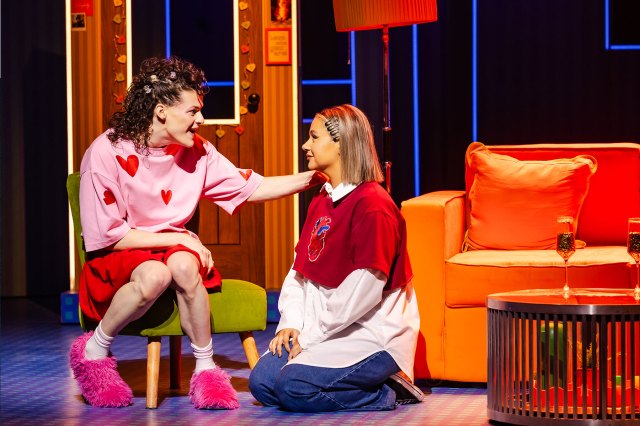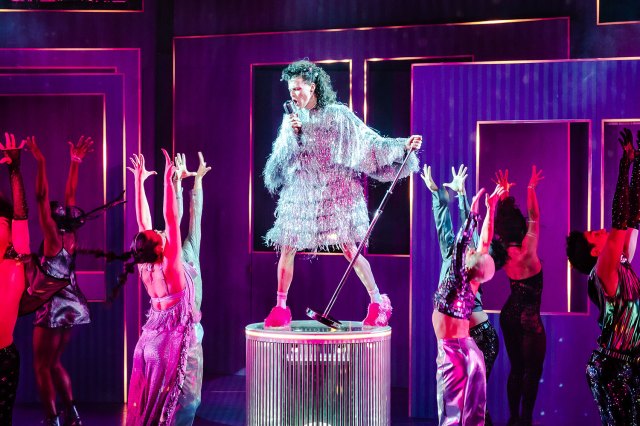Were the critics besotted with the new musical from the Six creators?
Read the verdict on Toby Marlow and Lucy Moss’ Why Am I So Single?

Sarah Crompton, WhatsOnStage
⛤⛤⛤⛤⛤
“Why Am I So Single? is warm, bold and overflowing with ideas. Not all of them land, but its fizzing generosity makes it one of the most enticing new musicals since, well, Six. It may not have the same broad appeal as that show, but it boasts sensational performances from Jo Foster (Oliver) and Leesa Tulley (Nancy). It feels like a hit.
“Its energy and bravery spring from its wild inventiveness. Moss’s production (with co-director Ellen Kane also providing lively, tight choreography) turns actors into bins, a fridge (magnet reading ‘Live, Love, Sob’) and curtains in the flat where our sadsack couple sit on a sofa and sip prosecco while trying to answer the question in the title.
Clive Davis, The Times
⛤⛤⛤⛤
“What’s so encouraging about this perky journey through the world of Gen Z dating is that it combines wonkish enthusiasm for the history of show tunes with an unabashed sense of humour. If Toby Marlow and Lucy Moss have built their script around the very meta theme of the struggle to write a hit show, they blend the insider wit with the universal subject of the search for love in a world in which we can’t stop chasing perfection on our smartphones.”
Holly O’Mahoney, The Stage
⛤⛤⛤⛤
“The show’s deft brilliance is in the lyrics of its songs. “Eight Dates”, about the brutal ghostings and last-minute cancellations rife in online dating, bottles the phenomenon superbly, while “Meet Market”, with its takedown of dating profile clichés (likely to be lost on anyone who’s never swiped to find romantic connection), and “C U Never”, with its tap-dancing chorus and clever incorporation of texting sound effects into the score, are further highlights. Power pop is the dominant genre, but exceptions include “Shhh!!!!”, a jazzy pastiche of classic cabaret in which Oliver unpacks troubles particular to the queer dating scene, and Nancy’s tearjerker “Just in Case”, about leaving the door ajar for the one that got away.”

Isobel Lewis, i News
⛤⛤⛤⛤
“There is a clear stand-out on the soundtrack in Oliver’s act two epic anthem “Disco Ball”. As they stand raised above the stage in a sparkling jacket while the snazzily dressed ensemble groove, it looks at first like your standard, Kinky Boots-esque disco number.
“Instead, Moss and Marlow delve into the ways queer people entertain as a defence mechanism. The lengthy song includes an old-school comedy club routine in which Oliver croons to the punters: ‘No one wants to see the broken ugly pieces of a disco ball up close – but they don’t mind them so much when they’re making the room sparkle.'”
Nick Curtis, Evening Standard
⛤⛤⛤⛤
“The cartoonish set by Moi Tran (with the visible band above) and the hectic direction by co-writer Moss and Ellen Kane, who also supplies the energetic choreography, contribute to a sense of fizzy fun edged with desperation.
“Tulley and Foster’s voices initially lack body but mature and grow movingly throughout the evening. Noah Thomas exhibits easy charm and loose-limbed grace as their friend Art Fulldodger (groan).”
Laura Rutkowski, Radio Times
⛤⛤⛤⛤
“Marlow and Moss strike again with some absolute earworms, particularly the opening track, “Why Am I So Single?”, and “Disco Ball”. In the number “C U Never”, where Oliver and Nancy’s friend Artie (a charismatic Noah Thomas, Everybody’s Talking About Jamie) helps Nancy compose a text, the accompanying tap routine is so witty, which is what Marlow and Moss excel at.”
Adam Bloodsworth, City AM
⛤⛤⛤⛤
We’re hanging out with Oliver and Nancy in the living room of their share house, their names an homage to their favourite musical, Oliver! (One of many self-knowing musical references the audience pours over.) Songs generally characterise the challenges the duo face when dating, like Meet Market, a comment about the promiscuous nature of queer dating, and Men R Trash, a slight at heteronormativity that isn’t as mean nor as reductive as it sounds. Marlow and Moss know better than that and most of the songs slap.
Sarah Hemming, Financial Times
⛤⛤⛤⛤
The whole thing has a breezy, bonkers late-night Fringe quality, underpinned by playful design from Moi Tran (set) and Max Johns (costumes). In Moss’s production even the furniture (played by the company) gets in on the act, with the cheese plant upstaging everyone by entering too early. But streaking through it is something sadder: a soaring solo from Tulley’s Nancy reveals that she is still grieving her ex and the loss of her father; a striking number from Foster’s Oliver demonstrates how he/they (the character is non-binary) hides insecurity beneath a bubbly facade. It’s in fronting up to these issues that they realise what they have in each other.
Arifa Akbar, The Guardian
⛤⛤⛤
“The show resembles Michael R Jackson’s searing A Strange Loop, in its self-referential central premise but it worked to bigger and deeper effect in that musical. This really does feel like two people on a stage with only one other recurring character, Artie (Noah Thomas), and an ensemble that never really comes to life outside Kane’s fun, pop video choreography.”
Alice Saville, The Independent
⛤⛤⛤
“Where Six’s 80-minute runtime meant it could get away without having much of a story, this two-and-a-half-hour show definitely sags – its endless callbacks and in-jokes are no substitute for a satisfying storyline. Sometimes, its makers sassily rebel against the pressures they’re under to write a classic musical. The closing number to act one is traditionally where composers put their most epic, narratively ambitious numbers: think “One Day More” in Les Miserables or “Defying Gravity” in Wicked.
“Here, we get… “There’s a Bee”, a novelty number where Nancy and Oliver extravagantly freak out because an insect got in their living room. It’s all very camp and self-aware, even if being aware of your plot’s flaws isn’t as satisfying for an audience as actually fixing them.”

Dominic Cavendish, The Telegraph
⛤⛤⛤
“Rather like Oliver himself, one wants more. Tulley’s personable character has a beautiful number about grief, but she’s a touch too bland prior. What lies outside their bubble? What are their everyday and amorous encounters really like? The twinkling, kilt-wearing Foster is non-binary, like the charming outsider they play; yet a lot of obvious related issues about identity feel skirted round. And if they do ultimately come, cutely, to view friendship as love – a spoofy rock number sets up parallels to Friends’ Ross and Rachel – what does that mean for them, and even their generation? I can’t say “swipe left” – this isn’t easily dismissed. But for all the jokes about it being a work-in-progress, that’s finally what it feels like.”
Andrzej Lukowski, Time Out
⛤⛤⛤
“Six exhibited similarly arch meta humour but it was also an aggressively tight 80-minutes – the follow up could really do with that sort of economy. Nancy and Oliver are decent company, especially Foster’s flamboyantly loserish Olivier. But after two-and-a-half hours with them I didn’t feel significantly more involved than I did at the start.
“Part of the problem is that Moss and Marlow are determined to make their on-stage proxies #relatable – they come across as generic quirky BFFs living regular lives, when it might have been more interesting if they were struggling to adjust to life after writing an enormously successful musical about the wives of Henry VIII.”

















